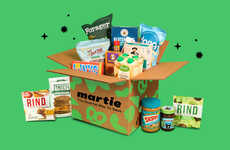
Daily Table Offers Healthy and Premium Food Items at Low Prices
Jana Pijak — December 17, 2015 — Social Good
References: foodbeast & thedailybanter
Unlike pricier boutique grocers, Daily Meal is a premium food retailer that offers quality at a low price. With its first location opened in Boston, the grocer has changed the way local residents look at nutrition. While many of Boston's low-income families opt for a fast food meal plan, Daily Meal prides itself on a business model that offers premium products at a low price.
Daily Meal is able to keep operating costs and prices low by sourcing foods that are at a surplus, or nearing their expiration date. The company's founder Doug Rauch is the former president of Trader Joe's and has created a socially conscious business that is successful thanks to its close ties with farmers, local markets and food manufacturers.
In addition to promoting a "high quality at a low cost" retail model, Daily Meal also addresses America's re-occurring food waste problem.
Daily Meal is able to keep operating costs and prices low by sourcing foods that are at a surplus, or nearing their expiration date. The company's founder Doug Rauch is the former president of Trader Joe's and has created a socially conscious business that is successful thanks to its close ties with farmers, local markets and food manufacturers.
In addition to promoting a "high quality at a low cost" retail model, Daily Meal also addresses America's re-occurring food waste problem.
Trend Themes
1. Low-cost Premium Food Retailers - A trend of premium food retailers offering quality products at low costs, often sourcing surplus or near-expiration goods.
2. Socially Conscious Grocery Stores - A trend of grocery stores that prioritize social responsibility with close ties to farmers, local markets, and food manufacturers.
3. Food Waste Reduction Initiatives - A trend of businesses and organizations addressing America's food waste problem by repurposing surplus or near-expiration goods and promoting responsible consumption.
Industry Implications
1. Grocery Retail - Existing grocery retailers can explore cost-effective ways to offer premium products, create socially responsible business practices and repurpose excess goods.
2. Food Manufacturing - Food manufacturers can collaborate with surplus food retailers to donate or repurpose their products and reduce waste.
3. Sustainability and Waste Management - Sustainability and waste management agencies can partner with surplus food retailers to create awareness about responsible consumption, promote and implement food waste reduction programs.
5.7
Score
Popularity
Activity
Freshness























